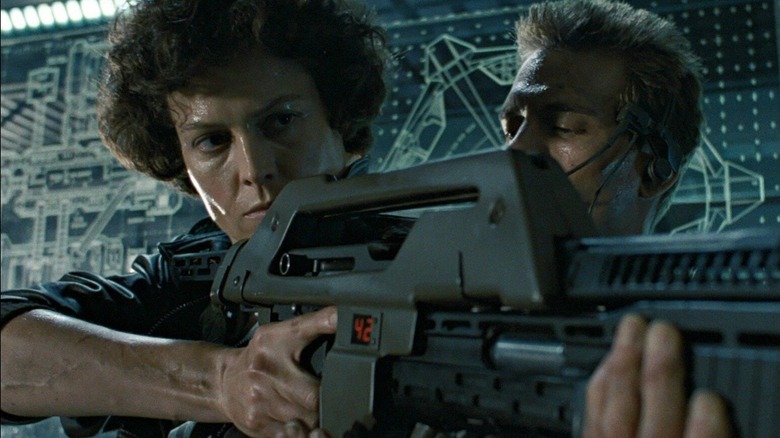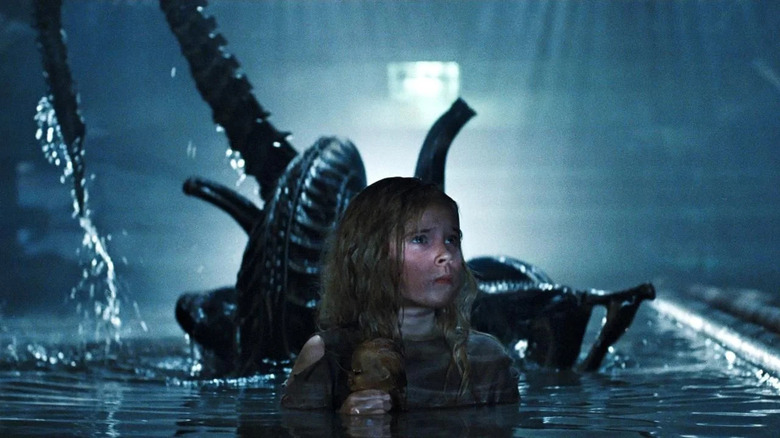Some Behind-The-Scenes Confusion Led To Sigourney Weaver's Favorite Aliens Scene Being Cut
As far as sequels go, James Cameron's "Aliens" has always been a standout in a series not without lackluster entries like "Alien: Resurrection." Not only is the film as terrifying as the first, but it's also a faithful expansion of sci-fi heroine Ellen Ripley's (Sigourney Weaver) struggle against her Xenomorph nemesis and the reckless hubris of the Weyland-Yutani organization. It also probably helped that Cameron had just made his own mark on the sci-fi genre with "The Terminator."
Although Weaver initially rejected multiple offers, she did eventually agree to reprise her role as Ripley after seeing the script for "Aliens." Part of the appeal was its emphasis on a side of her character yet unexplored: motherhood. Unfortunately for Weaver, a scene she considered pivotal for her character was cut from the film's theatrical release. To make matters worse, Cameron agrees the scene in question shouldn't have been removed. So why was such an important moment, one necessary to understanding Ripley's motivations in "Aliens" and its central themes, removed?
Ripley mourns her daughter
The scene in question comes early in the director's cut of "Aliens," which reinserted it and others back into the film. After learning she's been in cryostasis for almost six decades, she's told by Weyland-Yutani representative Carter Burke (Paul Reiser) that her daughter has recently passed away at the age of 67. In a DVD commentary for the film, James Cameron revealed his views on the scene's crucial importance to Ripley's story:
"Even though I liked the symmetry of the fact that she had had a daughter, and lost her daughter — that's Sigourney's mother by the way, so there's an interesting inversion here. She's looking at the face of her mother, but playing it as her daughter. But as an actor, it allowed her to work the connection, because I always say all my movies are love stories, and this one is about parental love and protectiveness, and a sense of duty, and the ultimate sacrifice that a person would make given that sense of duty. That was a nice touch, that was Sigourney's idea."
"Aliens" is not significantly marred by the removal of the deleted scene, but after watching it, you have to wonder why something so elegantly key to Ripley's character was removed. Unlike "Alien," the sequel isn't just about Weaver's character struggling to survive being hunted by the Xenomorphs. Instead, Cameron deliberately focuses on the contrasting forms of motherhood illustrated by Ripley and the alien queen. The scene underscores why she has a selfless desire to protect Newt (Carrie Henn) as if she were her own child. As Cameron explains, it makes all the more sense that Ripley is willing to sacrifice it all when you're also privy to the fact she's still wrestling with the death of her biological daughter.
Cameron thought Weaver disliked the scene
So if the scene was so important to James Cameron, why did it get cut? According to the director's own explanation given in the same DVD commentary, it was owed to a misunderstanding between him and Weaver.
"Here's a scene that was cut from the release version of the film, which became the source of a little bit of controversy with Sigourney, because she later said in print she had based her entire character throughout the film on this scene, and she was devastated when it was removed. Although at the time she first screened the film, she told me she didn't like the scene, and then we wound up reading a lot of interviews where she had a big problem with that."
Cameron goes on to say that because of a "tight post-production schedule," he didn't have the opportunity to discuss whatever apprehensions the actor might've had over the scene. The insinuation is he probably thought he was fulfilling Weaver's wishes when the scenes were removed by editor Ray Lovejoy ("2001: A Space Odyssey," "The Shining"). Apparently, her apprehensions did not involve questioning the scene's significance to her character. As much as Cameron chalks the debacle up to a lack of communication, that's not the only reason given for the omission of scenes from the theatrical release.
Weaver believes the scene was cut for time
It's an unfortunate reality for any film that run time is a factor that overrides more essential elements like plot and characterization. According to producer Gale Anne Hurd's commentary, "Aliens" was no different. She attributed the scene's removal to a push to get the movie closer to the two-hour mark:
"This scene was one of the seminal scenes in the movie, and was one of the ones that had to be deleted and omitted from the theatrical version because of length. We didn't have multiplexes back then, and there were only so many showings a day that you could have of a film, and we had to get it no more than two hours and 10 minutes in order to get the maximum number of screenings a day."
The longer run time would've cut daily screenings at theaters down from five to four, an unacceptable earnings effect Fox production president Scott Rudin wasn't keen on risking. Adding insult to injury, the deleted scene is just short of two minutes, and even after it was removed, the film still clocked at two hours and 17 minutes. So even if the scene was removed because of time constraints, its omission didn't help get it to the two-hour mark. According to a 1986 Los Angeles Times article, in order to gain their coveted fifth showing at the cinema, they'd need to cut an additional 12 minutes from the movie. James Cameron told the Times:
"We were standing on this London sidewalk and Rudin asked us if there was anything that could be cut. But we felt that if we had to take out 12 more minutes, the movie wouldn't make sense."
Thankfully Cameron didn't relinquish another second of "Aliens" to Rudin's desire for cuts!



